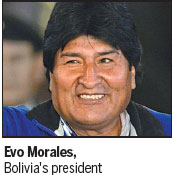Re-elected leader rose from poverty
Evo Morales grew up in poverty on Bolivia's high plains and was a llama herder, musician, soccer player and coca grower before rising to become the country's first indigenous president.
After overseeing almost nine years of nationalizations, pro-poor policies and an economic boom that has transformed Latin America's poorest country, the 54-year-old won re-election by a landslide on Sunday, according to exit polls.
He may be the region's longest-serving sitting president, but Morales remains immensely popular with Bolivians - 65 percent of whom are indigenous.
It is all a very long way from his childhood herding llamas and helping his parents in the fields in a small, arid village in western Bolivia's Oruro department.
"Until I was 14, I had no idea there was such a thing as underwear. I slept in my clothes ... (which) my mother only removed for two reasons: to look for lice or to patch an elbow or a knee," he said in a recent, highly candid autobiography.
Four of his six brothers and sisters died of malnourishment and disease.
Morales grew up speaking the Aymara language and attended school only briefly, struggling as a young man to fully master Spanish.
He was forced by drought to move to a coca-producing area in the early 1980s, where he played trumpet in a band and soccer, both of which allowed him to travel around the country.

He soon became a union leader for the coca farmers and led a number of protests that raised his profile and his politicization.
Anti-imperialist
He argued vociferously against the US-led campaign against coca farming, which Washington brands a drug-trafficking activity because of the leaf's use in cocaine.
Many Bolivians chew the leaf or brew it as a tea, and Morales has argued it is part of the country's cultural heritage.
In 2002, he ran for the presidency but narrowly lost.
The winner, Gonzalo Sanchez de Lozada, lasted only a year before handing power to his vice-president, partly because of pressure from Morales' union movement.
In 2005, Morales ran again, and won with nearly 54 percent of the vote.
He quickly established his "anti-imperialist" credentials and his affinity with Latin American leftists like Fidel Castro of Cuba and the late Hugo Chavez of Venezuela.
He dedicated his victory Sunday to the two men and to all "anti-imperialist and anti-capitalist" leaders.
(China Daily 10/14/2014 page12)














